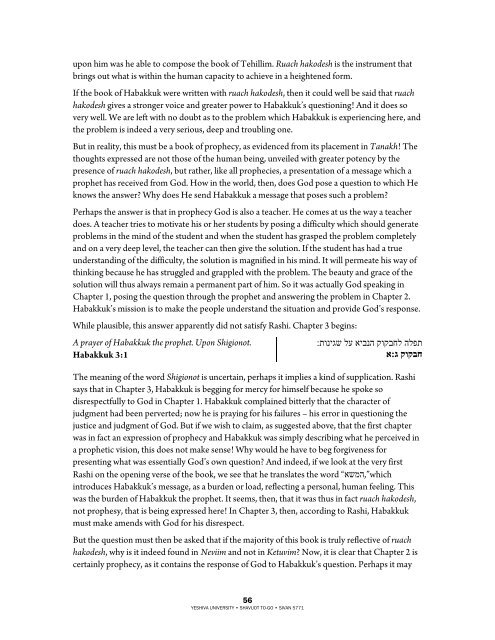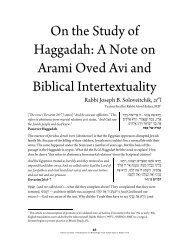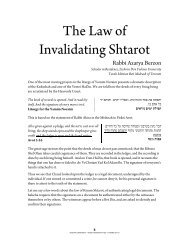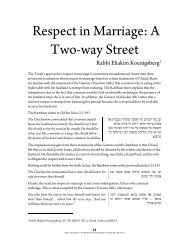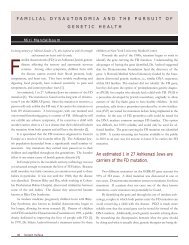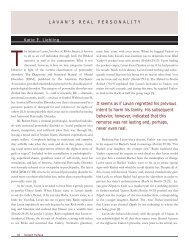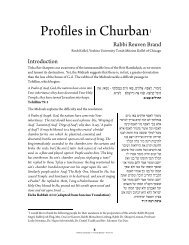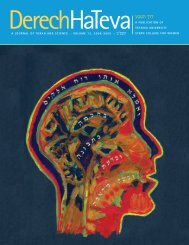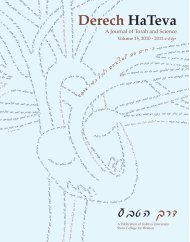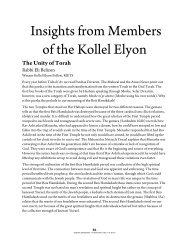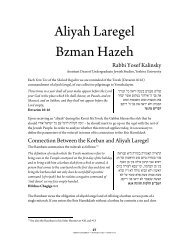You also want an ePaper? Increase the reach of your titles
YUMPU automatically turns print PDFs into web optimized ePapers that Google loves.
upon him was he able to compose the book of Tehillim. Ruach hakodesh is the instrument that<br />
brings out what is within the human capacity to achieve in a heightened form.<br />
If the book of Habakkuk were written with ruach hakodesh, then it could well be said that ruach<br />
hakodesh gives a stronger voice and greater power to Habakkuk’s questioning! And it does so<br />
very well. We are left with no doubt as to the problem which Habakkuk is experiencing here, and<br />
the problem is indeed a very serious, deep and troubling one.<br />
But in reality, this must be a book of prophecy, as evidenced from its placement in Tanakh! The<br />
thoughts expressed are not those of the human being, unveiled with greater potency by the<br />
presence of ruach hakodesh, but rather, like all prophecies, a presentation of a message which a<br />
prophet has received from God. How in the world, then, does God pose a question to which He<br />
knows the answer? Why does He send Habakkuk a message that poses such a problem?<br />
Perhaps the answer is that in prophecy God is also a teacher. He comes at us the way a teacher<br />
does. A teacher tries to motivate his or her students by posing a difficulty which should generate<br />
problems in the mind of the student and when the student has grasped the problem completely<br />
and on a very deep level, the teacher can then give the solution. If the student has had a true<br />
understanding of the difficulty, the solution is magnified in his mind. It will permeate his way of<br />
thinking because he has struggled and grappled with the problem. The beauty and grace of the<br />
solution will thus always remain a permanent part of him. So it was actually God speaking in<br />
Chapter 1, posing the question through the prophet and answering the problem in Chapter 2.<br />
Habakkuk’s mission is to make the people understand the situation and provide God’s response.<br />
While plausible, this answer apparently did not satisfy Rashi. Chapter 3 begins:<br />
A prayer of Habakkuk the prophet. Upon Shigionot.<br />
Habakkuk 3:1<br />
56<br />
YESHIVA UNIVERSITY • SHAVUOT TO-GO • SIVAN 5771<br />
: תוניגש<br />
לע איבנה קוקבחל הלפת<br />
א:<br />
ג קוקבח<br />
The meaning of the word Shigionot is uncertain, perhaps it implies a kind of supplication. Rashi<br />
says that in Chapter 3, Habakkuk is begging for mercy for himself because he spoke so<br />
disrespectfully to God in Chapter 1. Habakkuk complained bitterly that the character of<br />
judgment had been perverted; now he is praying for his failures – his error in questioning the<br />
justice and judgment of God. But if we wish to claim, as suggested above, that the first chapter<br />
was in fact an expression of prophecy and Habakkuk was simply describing what he perceived in<br />
a prophetic vision, this does not make sense! Why would he have to beg f<strong>org</strong>iveness for<br />
presenting what was essentially God’s own question? And indeed, if we look at the very first<br />
Rashi on the opening verse of the book, we see that he translates the word “אשמה,”which<br />
introduces Habakkuk’s message, as a burden or load, reflecting a personal, human feeling. This<br />
was the burden of Habakkuk the prophet. It seems, then, that it was thus in fact ruach hakodesh,<br />
not prophesy, that is being expressed here! In Chapter 3, then, according to Rashi, Habakkuk<br />
must make amends with God for his disrespect.<br />
But the question must then be asked that if the majority of this book is truly reflective of ruach<br />
hakodesh, why is it indeed found in Neviim and not in Ketuvim? Now, it is clear that Chapter 2 is<br />
certainly prophecy, as it contains the response of God to Habakkuk’s question. Perhaps it may


